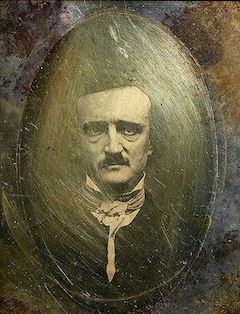When Poe was finally admitted to the canon of respectable writers, in the second half of the 20th century, it was over the objection of some high-minded, hand-wringing critics, and by then not only had his reputation acquired an unshakable whiff of pulpiness, of mystery tales and B-movie horror stories, but there also remained a lingering suspicion that all those deranged, neurasthenic narrators in his works, obsessed with premature burial, claustrophobia and sickly maidens dying young, were perhaps not so different from the author himself. The novelist and screenwriter Terry Southern, who claimed that his own wilder imaginings were inspired by Poe, once called him “King Weirdo” and added “not for the squeamish.”
Coincidentally, another friend, the Dutch artist Ben Schot, had passed along to me a beautifully produced Sea Urchin Editions copy of The Unparallelled Adventure of one Hans Phaall (2001), now o.p. but still available, which he published and edited to integrate the original Poe story, “Hans Phall — A Tale,” with several later versions so that the result more accurately reflects Poe’s best intention. Schot explains in the introduction:
After its first publication in the ‘Southern Literary Messenger’ of June 1835 ‘Hans Phall’ was revised and reprinted several times. For this edition I decided not to reprint one of the earlier versions of the tale but rather to combine some of them into a new one: hence the hybrid title ‘The Unparallelled Adventure of one Hans Phaall.’ The reasons for doing so is that, in my opinion, some of Poe’s revisions add to the original tale, whereas other revisions harm it. For instance, Poe’s correction of his erroneous remarks about the earth’s convexity when seen from a great altitude, is a clear example of a beneficial revision. And so I included it in this edition. But the removal from the original tale of two passages for the sole purpose of using them in later tales (viz. in ‘The Island of the Fay’ and ‘The Murders in the Rue Morgue,’ both published in 1841) is a true impariment. Now that there is no longer any need to prove that Poe was a resourceful writer who didn’t have to repeat himself to come up with a good story, I think it is only just to restore to ‘Hans Phall’ both passages: one a hallucinatory fantasy of lunar scenery, the other a plea for more intuitive practice of science.
Schot’s interest in the tale is twofold. As an artist who lives and works in Rotterdam, he is intrigued both by Poe’s “hallucinatory imagination” and by the story’s connection to the city, which Poe “never visited.” Schot writes:
He conjured it from whatever he may have read or heard about it, and consciously created a ‘lunatic’ counterpart of what is known to be a very level-headed and industrious town. In so doing, Poe left Rotterdam … a burlesque image of itself, a reflection in a distorting mirror, a caricature of reason and realism with pompous fools called ‘Superbus Von Underduk’ and ‘Rub-a-dub’ as President and Vice-President of the Rotterdam College of Astronomy.
These days, especially with the idiotic U.S. government shut down by a bunch of nasty Tea Party Banana Republicans in the Congress, a “caricature of reason and realism with pompous fools” describes a helluvalot more than the city of Rotterdam. “Superbus Von Underduk” makes the perfect moniker for House Speaker John Boehner, the supposed man of Republican reason, and “Rub-a-dub” makes an equally perfect moniker for Ted Cruz, the Senate filibusterer.


!['The Unparalleled Adventure of one Hans Phaall' by Edgar Allan Poe, edited by Ben Schott [Sea Urchin Editions, 2001]](http://www.artsjournal.com/herman/wp/wp-content/uploads/2013/10/POE-SEA-URCHIN-COVER.jpg)



